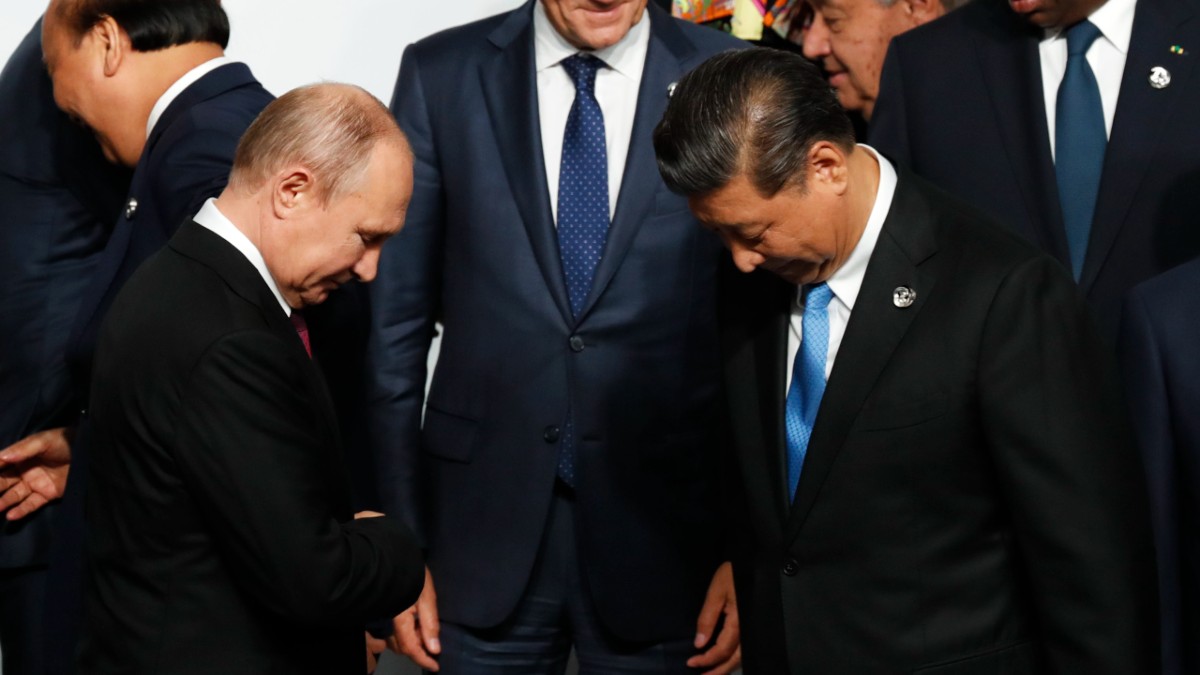Seeking the right words: China backs Putin in Ukraine, plays wait and Xi on energy

FILE: OSAKA, JAPAN - JUNE 28, 2019: Russian President Vladimir Putin (L) and Chinese President Xi Jinping search for common ground (Photo by Kim Kyung-Hoon - Pool/Getty Images)
Chinese President Xi Jinping and Russian President Vladimir Putin have agreed in Moscow to cooperate on a range of economic and business areas, both countries said Wednesday.
Xi kicked off his historic, unprecedented etc 3rd term as president by making his first state visit Moscow where he met this guy.
And for a bit of a turnip, President Putin has never missed the impression a good entrance can make:
Pomp and circumstance in the Kremlin as Putin’s talks with Xi get underway. pic.twitter.com/LJDjehtvui
— max seddon (@maxseddon) March 21, 2023
“The Russian side held a grand welcome ceremony at the airport,” China’s state-run Xinhua gushed. “The military band played the national anthems of China and Russia.”
That being said, the optics weren’t terrific for President Vlad: The former KGB man came off as short, poor, bald and desperate. By contrast his well-fed guest looked like a r9ch man at his daughters 7th wedding: Bored, powerful, and ready to grant favours should the opportunity for self-aggrandisement appear.
Xi and Putin signed two statements overnight, one very long titled “Deepening the Comprehensive Strategic Partnership of Coordination for the New Era” and a wee one titled “Pre-2030 Development Plan on Priorities in China-Russia Economic Cooperation.
Critically, there’s still a lot of leverage to be given over before Putin can win Xi’s must have economic lifeline:
The lines on Power of Siberia-2 fall well short of Putin’s rhetoric, which made it sound like the pipeline was a done deal. It just says Russia and China will “make efforts to advance work on studying and agreeing” plans to build the pipeline. pic.twitter.com/3wvljGusWR
— max seddon (@maxseddon) March 21, 2023
While the American China expert Bill Bishop said he was yet to find a full english translations for either statement, he seemed to accept there was little in the form of fresh and concrete takeaways, other than what we already know of their intentions for vague joint coordination.
“The longer one does not read to me like there is any real daylight between the two; rather it seems an intensification and broadening of the relationship, in large part in service of revising the global order,” Bishop says.
On the Ukraine front, Bishop was less hopeful.
“The section on Ukraine seems no different than what the PRC side has been saying for a while. I think we should expect things to get much grimmer. I hope I am wrong and please tell me I am.”

There are just two stories on the page of today’s RenMin Ribao (People’s Daily) focusing on the regal atmosphere around Xi’s talks with Putin.
Xinhua English has the full translated report. Seems it really was a lovely day:
“In the refreshing weather of March in Moscow, Xi arrived at the Kremlin in a motorcade. He was welcomed by the Kremlin’s horse guards and greeted by the Kremlin Commandant at the alighting point. Putin held a solemn welcome ceremony for Xi at the St. George’s Hall. Accompanied by the majestic welcome music, Xi and Putin walked in big strides on a red carpet from the opposite ends of the hall to meet each other in the center. They had a firm handshake and took photos together. The military band played the national anthems of China and Russia. The two presidents held small-group talks first and then large-group talks.”
As per usual Russia thinks it’s a military-economic alliance to the death…

While diplomatically China is as deft as ever – saying a lot without saying anything…

Xi and Putin also discussed Taiwan — a major source of tension between China and the U.S. Russia supports Beijing’s “one China” principle and acknowledges Taiwan to be an inalienable part of China, according to the joint statement.
Russia opposes Taiwan’s independence, and supports Chinese actions to protect its sovereignty and territorial integrity, the statement also said.
In a further signal of their united front against the U.S., the leaders called for a multipolar world order and expressed concerns over the AUKUS security pact between the U.S., the U.K. and Australia.
On the economic front, Xi said the same nondescript waffle he offers every country which has stuff China can use.
“China-Russia cooperation enjoys significant potential and space and is strategic, reliable and stable, that the two sides need to strengthen overall coordination, boost trade in traditional areas, such as energy, resources, and electromechanical products, continuously enhance the resilience of industrial and supply chains, expand cooperation in such areas as information technology, the digital economy, agriculture and trade in services. They should step up cooperation in areas of innovation and facilitate cross-border logistics and transportation…”
China is already Russia’s largest trading partner.
The official statements from both sides offered really very few details on dates, numbers, or even a timeline of implementation, other than saying the plan focused on the years leading up to 2030.
Energy is the clincher
During the Q&A Putin said they’d essentially pretty much fully agreed on that second gas pipeline from Russia to China.
The target here, Putin says, is to deliver circa 100 billion cu. meters of natural gas to China by 2030.
Russia aims to expand natural gas exports to China as sanctions squeeze sales to Europe. Putin had made similar comments on the pipeline last year, though certain details of the proposed pipeline still need to be worked out.
The FT knocks this one on the head:
“The lack of substance in Putin’s rhetoric about the talks, which he described as “warm, comradely and constructive”, underscored Russia’s diminishing influence as its reliance on China’s political and economic backing deepens.
Beijing has offered Moscow a crucial economic lifeline during the war by increasing purchases of its energy exports and replacing western goods and components restricted by the sanctions. The Tuesday talks, however, showed that the further deepening of economic ties was still subject to negotiations.
The readout then adds Putin’s comments.
He said that “we expect Russian-Chinese trade not only to reach $200 billion” this year and “go beyond this threshold.” “When it comes to investment, our countries have compiled a package of 80 important and promising bilateral projects in various fields worth around $165 billion. Energy cooperation is expanding. Russia is a strategic supplier of oil, natural gas, including LNG, coal, and electricity to China. The construction of nuclear power facilities continues according to schedule. Russian business can meet the Chinese economy’s growing demand for energy, both in terms of the projects currently underway and those that are still in the works. Russian gas supplies to China are to reach at least 98 billion cubic metres by 2030, plus 100 million tonnes of liquefied natural gas. We have just discussed a good project, the new Power of Siberia-2 gas pipeline across Mongolia. We have reached agreement on most of the deal’s parameters. Russia will export 50 billion cubic metres of gas from reliable, stable supplies.”
CNBC notes the focus of Chinese media has been on the prominence on the list of increasing the use of “local” currency.
“The Kremlin was more explicit in stating that the yuan and ruble already account for two-thirds of trade deal payments between the two countries.”
Putin, again:
“It is important that our national currencies are increasingly used in bilateral trade. We should continue promoting settlements in national currencies, and expand the reciprocal presence of financial and banking structures in our countries’ markets. As I have already said, at this stage, two-thirds of payments under trade deals between our countries are made in rubles and yuan.We support using Chinese yuan in transactions between the Russian Federation and its partners in Asia, Africa and Latin America. I am sure that these types of payment will grow between Russian businesses and their counterparts in third countries – as I said – payments in yuan.”
As Bloomberg has previously noted, Russia’s dependency on the yuan is growing rapidly across the board. The Chinese currency is gaining valuable traction from Russia’s growing dependency and looks pretty symbolic of the state of bilateral relations. This is from Alex Gabuev:
“The share of Russian exports settled in renminbi grew from 0.4% to 14% in the first nine months of 2022, according to Bank of Russia data.
Yuan deposits have become available in all major banks, and so the Russian households’ yuan holdings jumped from zero to $6 billion in the same period: that’s 11% of the foreign currency they hold. As Alexandra Prokopenko, a former adviser to the Bank of Russia, demonstrates in her research for the Carnegie Endowment for International Peace, the Moscow Stock Exchange also shows demand for yuan going through the roof, with trading in renminbi increasing to 33% from 3% before the war.
The number of days when trading in yuan on the exchange exceeds the volume of trade in dollars and euros is constantly growing. These groundbreaking changes can be explained not just by restricted access to the dollar and euro in Russia as the result of sanctions, but also by the tectonic shifts in the geography of Russian trade.
Moscow’s imports from the West have crashed because of sanctions, and exports to the West are increasingly affected, too. Against this backdrop, Moscow was forced to shift the majority of its trade to China, which in 2022 accounted for 40% of Russian imports and 30% of exports.”
Other areas the agreement covered included: expanding bilateral trade, cooperating in energy and food security and developing rail and other cross-border logistics infrastructure.
The package of documents signed during the visit includes:
- An intergovernmental agreement on cooperation in the joint production of television programmes,
- Documents concerning cooperation between the National State Television and Radio Broadcasting Company (VGTRK) and the China Media Group, and on the exchange of information and cooperation between Russia’s ITAR-TASS news agency and the Xinhua News Agency
- Relevant ministries signed memorandums of understanding aimed at deepening cooperation in trade shows and exhibitions, in the management and use of forest resources, in soybean production, as well as industrial and infrastructure cooperation under preferential terms in the Russian Far East.
- The Russian Ministry of Science and Higher Education, the Chinese Ministry of Science and Technology, the Joint Institute for Nuclear Research and the Chinese Academy of Sciences signed a Protocol on Strengthening Cooperation in Fundamental Scientific Research
- The Rosatom State Atomic Energy Corporation and the Chinese Atomic Energy Authority also signed a Comprehensive Long-term Cooperation Programme on fast neutron reactors and closed nuclear fuel cycle development
- Relevant state agencies signed memorandums of understanding and cooperation regarding consumer protection and deeper cooperation in the management of state companies
President Xi will stay in Moscow for a third day on Wednesday.
Related Topics
UNLOCK INSIGHTS
Discover the untold stories of emerging ASX stocks.
Daily news and expert analysis, it's free to subscribe.
By proceeding, you confirm you understand that we handle personal information in accordance with our Privacy Policy.








